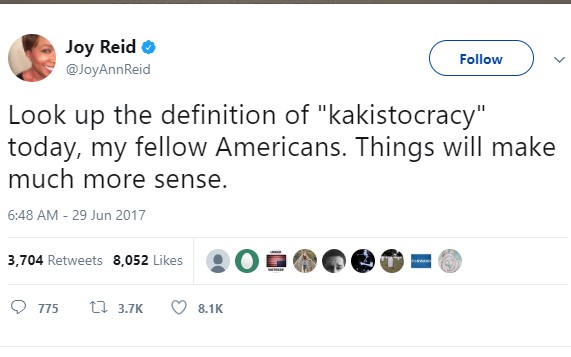Dakota Blackman
Kakistocracy
[kak-uh–stok-ruh-see]
Noun, plural kakistocracies
- Government by the worst persons; a form of government in which the worst persons are in power
Late this past June, journalist and MSNBC correspondent Joy Reid tweeted the following: “Look up the definition of ‘kakistocracy’ today, my fellow Americans. Things will make much more sense.” The tweet, which was liked over 8,000 times and retweeted nearly 4,000 times, prompted such a significant spike in searches for the word that Merriam-Webster devoted an entire article to it. Briefly, the word is Greek in origin, combining the root kakistos (meaning “worst”) with the familiar English ending -cracy (meaning “form of government”), which itself is derived from the Greek kratos (meaning “strength” or “power”). Dictionary.com notes in its definition that the root may also be tied to the Greek word kakos, meaning “evil” or “unpleasant” (its derivatives are recognizable in English in such words as cacophony), and perhaps even connected to the Greek prefix kako-, a not-so-subtle origin of the English slang word for “defecation”. Taken together, kakistocracy quite literally translates to the worst government.
Reid’s tweet was published on June 29th, 2017, a date in which kakistocracy was indeed helpful in contextualizing the day’s news. Some highlights from the day—other than the sale of an original R2-D2 model used in the Star Wars films for a whopping $2.76 million—included the passage of the second watered-down iteration of the travel ban. This action barred people from Libya, Sudan, Syria, Yemen, Iran, and Somalia from entering the country without proof of “a credible claim of a bona fide relationship” with a person, job, or educational institution in the United States as well as the passage of two bills aimed at targeting undocumented immigrants. One of these bills, titled “Kate’s Law,” increased criminal penalties for undocumented immigrants previously convicted of crimes in the United States; the second, titled the “No Sanctuary for Criminals Act,” allowed for the withdrawal of federal funding to sanctuary cities, those which do not actively comply with the federal government in their enforcement of immigration laws.
These controversial immigration laws and others that have since been passed by the administration, along with the overall erratic behavior of the man in charge, must call into question why, upon Reid’s tweeting, the Google searches spiked—and why this word resonated with so many. Perhaps it is the often flagrant dismissal of the conventions of our democracy (a meaningful or at least respectful relationship with the media, alleged collusions with foreign governments, the almost comical turnover of staff members, and the use of Twitter to disseminate thoughts, just to name a few); perhaps it is the type of legislation being advocated for and passed, much of which strips rights from those who already have little power (the work to further defund Planned Parenthood, public radio, and the arts, to revoke Obamacare and Deferred Action for Childhood Arrivals (DACA), just to name a few); perhaps it is even what is not being said, or the latency to take what seems to be the obvious, just side (the lack of ability to disavow white supremacist groups and their support, for example). Perhaps this is a kakistocracy for most people because most of us believe that those in power are indeed “the worst persons.”

